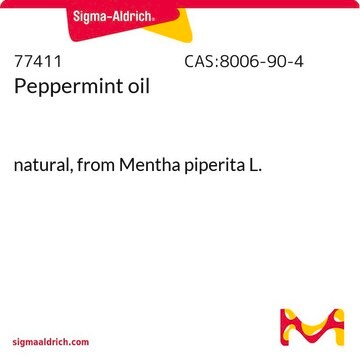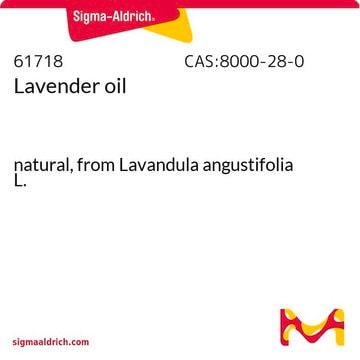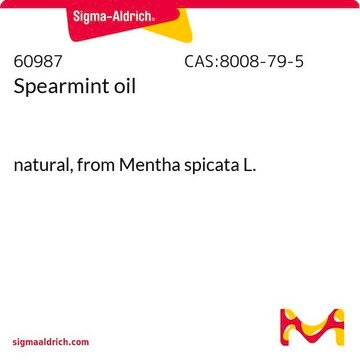W284815
Peppermint oil
natural, FCC, FG
Synonym(s):
Mentha piperita
About This Item
Recommended Products
biological source
Mentha piperita L.
Quality Level
grade
FG
Halal
Kosher
natural
reg. compliance
EU Regulation 1334/2008 & 178/2002
FCC
FDA 21 CFR 172.230
FDA 21 CFR 182.20
optical activity
[α]20/D −26°, neat
origin
USA origin
refractive index
n20/D 1.461 (lit.)
bp
215 °C (lit.)
density
0.898 g/mL at 25 °C (lit.)
application(s)
flavors and fragrances
Documentation
see Safety & Documentation for available documents
food allergen
no known allergens
Organoleptic
peppermint
Looking for similar products? Visit Product Comparison Guide
Application
- A full factorial experimental design to study the effect of flavoring agents on the mechanical properties of curcumin chewing gum tablets with high solids content.: The research explores how different flavoring agents, including peppermint oil, affect the mechanical properties of curcumin chewing gum tablets. This study is relevant for developing optimized formulations in pharmaceutical biochemistry (Al Hagbani et al., 2020).
- Stress Response and Virulence Potential Modulating Effect of Peppermint Essential Oil in Campylobacter jejuni.: This investigation looks into how peppermint essential oil modulates stress responses and virulence in Campylobacter jejuni, highlighting its potential application in biochemical studies related to microbial pathogenesis and infection control (Kovács et al., 2019).
- Application of in vitro lipolysis for the development of oral self-emulsified delivery system of nimodipine.: This paper discusses the use of in vitro lipolysis to develop an oral self-emulsified delivery system for nimodipine, incorporating peppermint oil as a key component. It emphasizes the role of biochemistry in enhancing drug delivery methods (Alayoubi et al., 2018).
Preparation Note
Signal Word
Warning
Hazard Statements
Precautionary Statements
Hazard Classifications
Aquatic Chronic 2 - Skin Irrit. 2 - Skin Sens. 1
Storage Class Code
10 - Combustible liquids
WGK
WGK 1
Flash Point(F)
150.8 °F - closed cup
Flash Point(C)
66 °C - closed cup
Personal Protective Equipment
Choose from one of the most recent versions:
Already Own This Product?
Find documentation for the products that you have recently purchased in the Document Library.
Our team of scientists has experience in all areas of research including Life Science, Material Science, Chemical Synthesis, Chromatography, Analytical and many others.
Contact Technical Service







